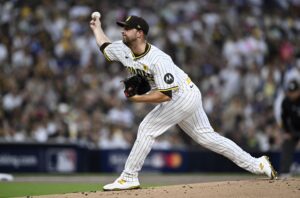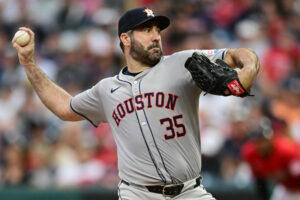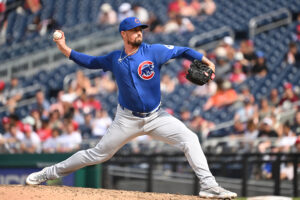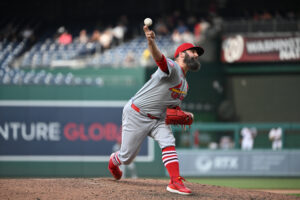With the season underway, fans are looking with optimism or skepticism at the free agent signings their respective teams have made. With that in mind, this series will take an in-depth look at free agent signings that made fans pinch themselves, hoping it was a dream. These moves will be selected for each team in a division. For the second installment of this series, we will take a look at the worst signings of the teams from the AL Central. If you missed the first installment looking at the AL West, check it out here.
Chicago White Sox
The Pick: Jaime Navarro
This edition in our series starts out strong with the Chicago White Sox signing pitcher Jaime Navarro to a four-year, $20 million contract on December 11th, 1996. For the White Sox, this move seemed great on two levels. The Sox stole a pitcher from their crosstown rivals, the Chicago Cubs, and Navarro had two great years for the Cubs pitching a 3.62 ERA with a record of 29-18 in 437 innings pitched. But it wouldn’t be before long the White Sox were kicking themselves for this signing as in his first year, Navarro would pitch a 5.79 ERA with a 9-14 record in 209.2 innings pitched. In his second year, things didn’t get better as Navarro pitched a 6.36 ERA with an 8-16 record in 172.2 innings pitched. In three years with the White Sox, Navarro would pitch a 6.06 ERA with a scary 25-43 record.
His third year would be his last with the White Sox as on January 12th, 2000, Navarro would be traded, along with John Snyder, to the Milwaukee Brewers, where he started his career. In exchange, the White Sox acquired Cal Eldred and Jose Valentin. He would later play for the Cleveland Indians after being released by the Brewers.
The Runner-Ups: Adam Dunn, Adam LaRoche
Cleveland Indians
The Pick: Kerry Wood
Pitcher Kerry Wood was coming off an All-Star year with a 3.26 ERA, which is why the Cleveland Indians signed him to a two-year, $20.5 million contract on December 10th, 2008. Wood would struggle in his first year as the Indians tried to shift Wood into a closer after being a starter for the Chicago Cubs. Wood pitched a 4.25 ERA in his first year with the Tribe, pitching 58 games converting 20 out of 26 save chances in 55 innings pitched. His second year, however, was a little bit rougher as Wood would pitch a 1-4 record with a 6.30 ERA in 23 games and convert 8 out of 11 save opportunities. Throughout his Indians career, Wood struggled to stay healthy.
On July 31st, 2010, Wood was traded along with cash to the New York Yankees in exchange for players to be named later (Andrew Shive and Matt Cusick). Wood went on to finish the year with the Yankees then went back to the Cubs, retiring during the 2012 season.
The Runner-Ups: Wayne Garland, Michael Bourn
Detroit Tigers
The Pick: Mike Moore
Coming off a season where the Detroit Tigers went 75-87, they needed to make a change. They decided to make that change by bringing in pitcher Mike Moore, signing him to a three-ear, $10 million dollar contract on December 9th, 1992. In his first year in Detroit, Moore’s record lived up to the hype as he went 13-9, but his ERA took a hit as it ended up being a 5.22, only the second time his ERA had gone over five in his career. Not only that, but Moore’s strikeouts would take a hit as he pitched 89 strikeouts, only the third time he had pitched under 100 in his career.
But that would not be the last time it would happen for his ERA or his strikeouts as in his second year, his ERA spiked again going up to a career high of 5.42, and his strikeouts down to a career low of 62. His third year would prove to be his last as his ERA hit 7.53 and his strikeouts rounded out at 64. On September 5th, 1995, Moore was released and would not play in MLB again.
The Runner-Ups: Dean Palmer, Bill Gullickson
Kansas City Royals
The Pick: Mark Davis
When a pitcher comes onto the free agent market who just won a Cy Young award, you snatch him up as quickly as possible. And that is exactly what the Kansas City Royals did when they signed pitcher Mark Davis to a four-year, $13 million contract on December 11th, 1989. But the deal would go south quickly as a year after putting up a 1.85 ERA for the San Diego Padres a year before, Davis would pitch a 5.11 ERA in his first year in Kansas City and had a 60% save conversion rate going 6 for 10. His record wasn’t the greatest either going 2-7. His second year with the Royals didn’t go quite as bad with a 4.45 ERA with a 6-3 record. He also had only two save chances, converting one of those chances.
During his third year in Kansas City, Davis was traded to the Atlanta Braves in exchange for Juan Berenguer. In the 13 games Davis played for the Royals in his third year, had a 7.18 ERA with a 1-3 record. After the trade, Davis would continue to play in the league until 1997.
The Runner-Ups: Jeff Francoeur, Jose Guillen
Minnesota Twins
The Pick: Tsuyoshi Nishioka
The only position player in this installment (though the case for pitcher Ricky Nolasco could be made), the signing of shortstop Tsuyoshi Nishioka started a string of international signing woes for the Minnesota Twins and was a signing that has been looked at as a lapse in judgment. Before signing with the Twins on December 16th, 2010 to a three-year, $9 million deal, Nishioka was a great hitter for the Chiba Lotte Marines in the Japan Pacific League. The year before making the move to America, Nishioka hit a .346 batting average, which was a career high for him. It was this year that caused the Twins to bid $5.3 million to gain his negotiating rights, and to trade away their incumbent shortstop at the time, J.J Hardy, to the Baltimore Orioles. But once Nishioka made his way over to the Twins, this dream signing quickly turned into a nightmare.
During the 2011 season, Nishioka would a .226 batting average with just 19 RBI and no home runs in 68 games. Nishioka would spend most of the 2012 season with the Twins AAA affiliate, the Rochester Red Wings, hitting a .258 there with 34 RBI and two home runs. Nishioka would be released by the Twins on September 28th, 2012 and head back to Japan. This move doesn’t seem like the worst on the surface, but what the Twins gave up to get Nishioka is what makes this move hurt. Hardy was a great shortstop for the Twins, and they traded him for Brett Jacobsen and Jim Hoey, who both never panned out. Now, Nishioka is still playing in the JPL for the Hanshin Tigers.
The Runner-Ups: ByungHo Park, Tony Batista
Embed from Getty Images






